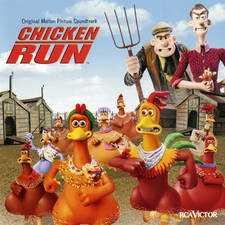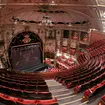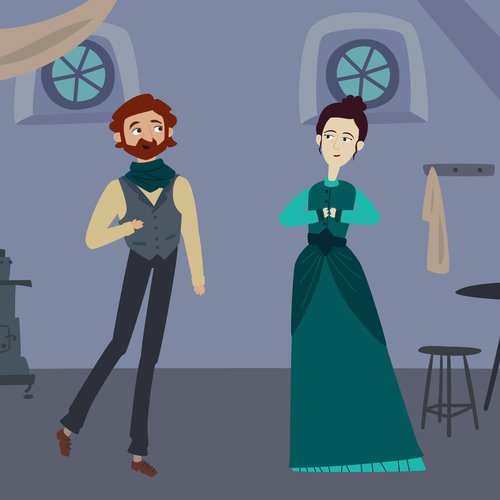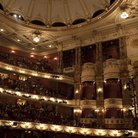Exclusive
Why beloved Christmas film ‘It’s a Wonderful Life’ makes the perfect opera
28 November 2022, 16:50 | Updated: 28 November 2022, 16:54

First performed 70 years after the film’s release, the operatic reimagining of the 1946 Christmas film ‘It’s a Wonderful Life’ opened a new production at the English National Opera this weekend, and its timing couldn’t have been better...
The black-and-white film It’s a Wonderful Life is a timeless Christmas story about an individual who does not realise the value he brings within his own community.
Released in 1946, the film directed by Frank Capra focuses on the main character of George Bailey, a family man who seems to have it all, but doesn’t see it himself. This leads our protagonist to contemplate suicide, but before he can go through with his plan he is saved by an angel, who shows him what the world would be like if he’d never been born.
The American Film Institute hailed the film as ‘America’s Most Inspiring Movie’, beating out works including Schindler’s List and To Kill a Mockingbird, and due to its cultural significance, the film was selected for preservation in the United States Library of Congress’ National Film Registry.
With a story that involves drama, tragedy, romance, and an overarching dark subject line, the plot has stark similarities to many opera themes. We sat down with American composer, Jake Heggie to learn how he did exactly that, and transformed the beloved Christmas film into an operatic version, currently playing at the London Coliseum this winter.
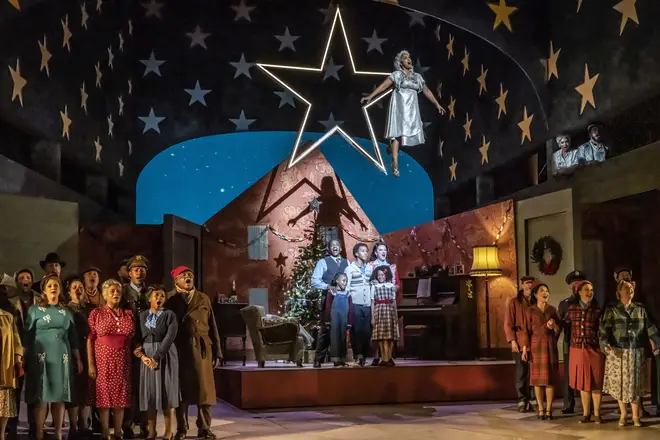
Why It’s a Wonderful Life makes a great opera
“‘It’s a Wonderful Life’ is a story of community and one’s value within that,” American composer, Jake Heggie tells Classic FM. “But at the heart of that story is this potentially great tragedy, which is George Bailey taking his life on Christmas Eve.”
Heggie chose to adapt the 1946 film for stage in 2011 along with librettist Gene Scheer, when he was asked by the Houston Grand Opera to write a Christmas opera, as the film’s storyline had “all the richness that opera demands” as well as “great joy and great magic and great power”.
While the plot lends itself to the artform of opera, changes to the original storyline were of course necessary to create this new work of art which shared the same name.
In the original 1946 film, the main characters of the film are found in family man, George Bailey, and the angel, Clarence, who saves the former from taking his own life.
However, in the opera, Clarence becomes Clara, and for good musical reason.
Read more: Watch English National Opera’s ‘TikTopera’ version of Netflix’s true crime documentary, Tiger King
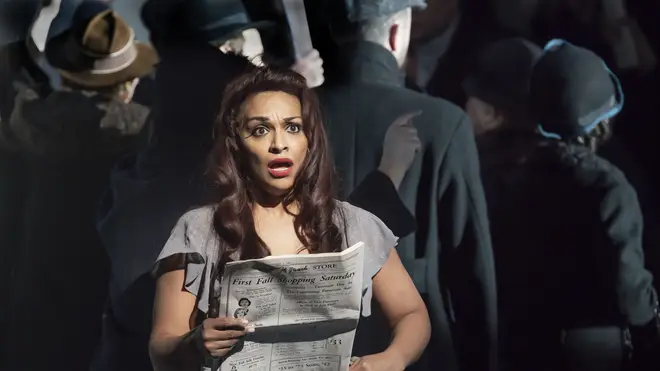
When transforming an already existing piece of creative work for the opera stage, “it really is all about vocal casting”, Heggie explains.
“My first question was George. What voice type do we want him to be? We were considering baritone, but as he’s very young for most of the play, we cast him as a tenor.”
Then there was the question of Clarence. The expected baritone casting of the angel would mean a night of tenor and baritone duets, which aren’t the easiest voices to tell apart when singing together.
So Heggie made the decision to swap the role of Clarence to Clara, a soprano. In the English National Opera production, George Bailey is played by American tenor Frederick Ballentine, and Clara is played by Australian soprano Danielle de Niese.
Read more: Sir Paul McCartney is turning ‘It’s a Wonderful Life’ into his first musical

It's a Wonderful Life ǀ The Opera ǀ English National Opera
The story of It’s a Wonderful Life still resonates with audiences 76 years later, with its themes on community, self-valuing, and making a difference in this world.
“For George, it takes a magical figure coming into his life to help him see the value of his own life,” Heggie explains. “We all seek community, we all seek to make a difference in the world, to believe that our presence is valued on the planet. And yet very often we’re conditioned not to not to see it.”
Heggie says that it’s not just angels like Clara who have to show you how much value you hold. “Angels can also come in human bodies,” he says. “They could be the person next to you, they could be a family member or a loved one who helps you to see the value of your of your life and how you've created this magical community.
“Everyone has those moments of feeling lonely and feeling isolated, especially during the Holidays. We want to believe that our presence is valuable, that there is magic, that there is possibility, that there is community, and I think that’s what the opera reinforces.”
Read more: What are the lyrics to ‘Hark! The Herald Angels Sing’ and what’s the story?

Spoken word artist, Kieron Rennie, asks ‘What makes a Wonderful Life?’
Despite being programmed for the ENO most likely years ago, the English opera house’s production could not come at a more relevant time for the company.
The ENO, like George Bailey, is currently facing a life-ending situation that pulls its value to the community into consideration. Following an Arts Council England funding decision at the start of the month, 300 jobs are at risk at the opera company after its annual £12.6 million subsidy from the government was replaced by an offer of £17 million over three years to “develop a new business model” and possibly move to Manchester.
An outcry from the opera house’s audience, workers, and famed singers across the classical music world has led to a petition being set up by legendary tenor, Sir Bryn Terfel, to save the company.
At the opening night performance of It’s a Wonderful Life, ENO’s resident spoken word artist, Kieron Rennie, asked, ‘What makes a life wonderful?’ in a piece performed before curtain up.
ENO Artistic Director, Annelise Miskommen, introduced his performance and spoke on the funding decision, signposting the audience to the petition.
During the introduction, Miskommen remarked, “Well, it won’t be a ‘Wonderful Life’ in the future if there’s no live opera sung by live opera singers”, which the London Coliseum audience responded to with thunderous applause.
‘It’s a Wonderful Life’ opened on Friday 25 November and runs until Saturday 10 December. Book your tickets here.
